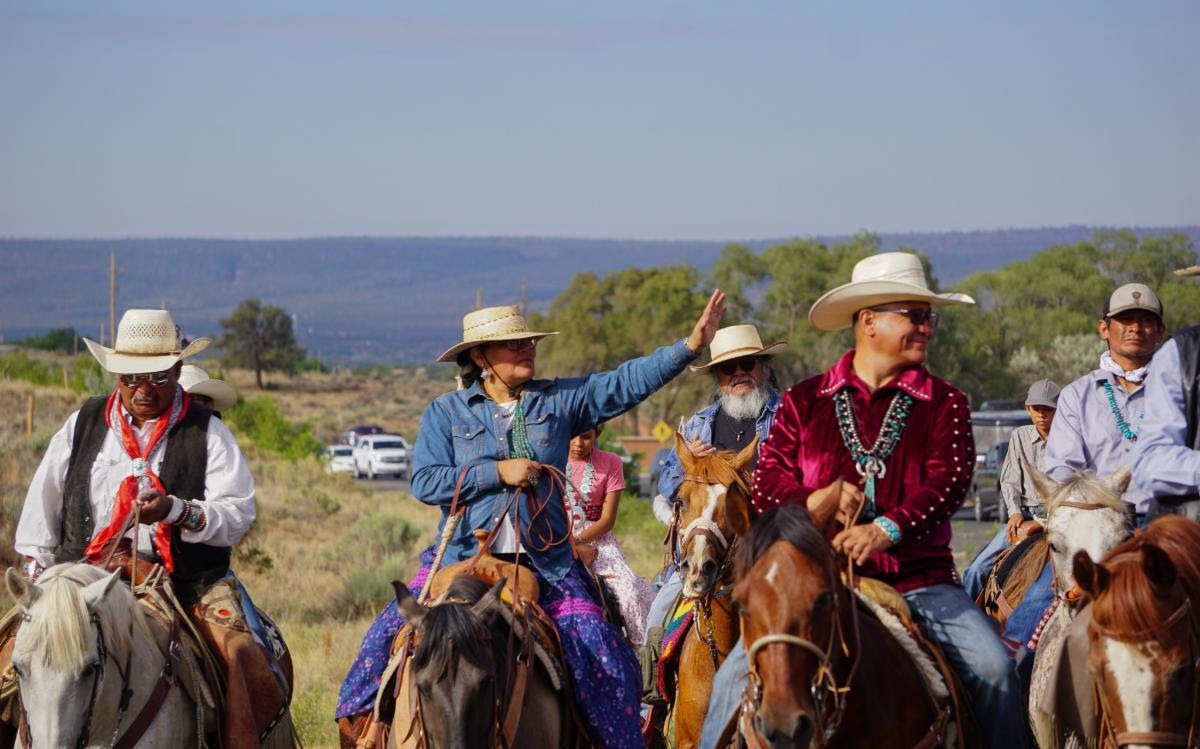
- Details
- By Native News Online Staff
On Monday, July 21, the 25th Navajo Nation Council officially opened its 2025 Summer Session with a ceremonial horseback arrival at the Council Chamber in Window Rock, Arizona. The traditional ride pays tribute to the legacy of past leaders who once traveled on horseback from across Diné Bikéyah to attend legislative sessions.
This year’s opening procession also included members of the late DeShauna and Del Lynn Peshlakai’s family, who marched to raise awareness about drunk driving. Delegates who participated in the trail ride included Casey Allen Johnson, Germaine Simonson, Lester Yazzie, Steven Arviso, and Rickie Nez.
In the days leading up to the session, riders journeyed from their home communities, stopping in local chapters to engage with residents—continuing a long-standing tradition of grassroots dialogue and community-based leadership.
“The summer session begins with a reflection of who we are as a Nation and the horseback ride reminds us of the responsibilities our ancestors carried,” Speaker Crystalyne Curley said. “We continue that work by listening to our communities and acting on their behalf.”
Following the formal call to order by Speaker Curley, the session continued with the posting of colors by the Navajo Women Veterans.
Eastern Navajo Ateed Yazhi Georgianna Begay led the Pledge of Allegiance, while Makayla Jones, Little Miss Ceremonial, performed the national anthem. An invocation was delivered by Anthony Howard, Vice President of the Bahasl’ah Chapter of the Native American Church.
Throughout the week, delegates will receive reports and consider legislation that impacts the Navajo people. The Summer Session is open to the public and livestreamed on the Navajo Nation Council’s Facebook and YouTube pages (@navajonationcouncil).
More Stories Like This
NCAI Passes Two Emergency Resolutions on Immigration Enforcement ActivitiesChickasaw Lighthorse Police Officer named Indian Country Law Enforcement Officer of the Year
Indian Gaming Association Rallies Broad Coalition Against Sports Event Contracts It Calls Illegal Threat to Tribal Sovereignty
Navajo Resources and Development Committee Issues Notice on Livestock Inspection Requirements
American Prairie, Tribal Coalition Files Protest Over Rescinded Grazing Rights
Help us defend tribal sovereignty.
At Native News Online, our mission is rooted in telling the stories that strengthen sovereignty and uplift Indigenous voices — not just at year’s end, but every single day.
Because of your generosity last year, we were able to keep our reporters on the ground in tribal communities, at national gatherings and in the halls of Congress — covering the issues that matter most to Indian Country: sovereignty, culture, education, health and economic opportunity.
That support sustained us through a tough year in 2025. Now, as we look to the year ahead, we need your help right now to ensure warrior journalism remains strong — reporting that defends tribal sovereignty, amplifies Native truth, and holds power accountable.
 The stakes couldn't be higher. Your support keeps Native voices heard, Native stories told and Native sovereignty defended.
The stakes couldn't be higher. Your support keeps Native voices heard, Native stories told and Native sovereignty defended.
Stand with Warrior Journalism today.
Levi Rickert (Potawatomi), Editor & Publisher


